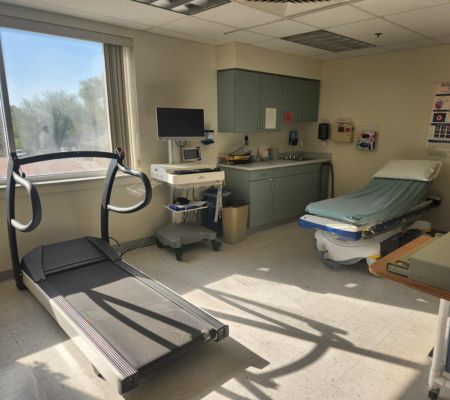
treadmill and hospital bed
Inpatient Respiratory Services/Outpatient Cardiopulmonary Testing
For questions, please contactRon Cothran, MBA-HM, RRT, CPFT
Director of Respiratory, Cardiopulmonary, Sleep and EEG
(719) 383-6314
rcothran@avrmc.org
Diagnostics Brochure
Inpatient Respiratory Services: 24 hours per day, 7 days per week
Respiratory therapists are specially trained healthcare professionals who help treat and restore function for patients with airway and breathing problems. We often assess and treat patients with the following conditions:
●Low oxygen levels
●Maintenance of special breathing tubes for patients unable to breathe on their own, or specialized masks/machines to assist patients in breathing while they sleep.
●Ventilators - machines that breathe for patients who are unable to breathe on their own.
●Chronic heart or lung problems that require breathing treatments and assistance
Below is a list of some of services we provide in the hospital:
●Advanced Life Support Team Member
●Arterial Blood Gas Analysis
●Bronchodilator / Medication Therapy
●Chest Physical Therapy / Pulmonary Hygiene
●Electrocardiography (EKG)
●Non-invasive Ventilation – Neonatal through Adult
●Continuous Positive Airway Pressure (CPAP) Therapy
●Bilevel Positive Airway Pressure (BiPAP) Therapy
●Heated High-flow Nasal Cannula (HHFC) Therapy
●Mechanical Ventilation – Neonatal through Adult
●Oxygen / Therapeutic Gas Therapy
●Smoking Cessation / COPD Disease Education
Outpatient Cardiopulmonary Testing
●Weekdays by appointment via AVRMC Central Scheduling
●Arterial Blood Gas Analysis
A blood test that requires a sample from an artery in your body to measure the levels of oxygen and carbon dioxide in your blood. The test also checks the balance of acids and bases, known as the pH balance, in your blood.
Cardiac Stress Testing
An exercise stress test helps determine how well your heart responds during times when it's working its hardest. It typically involves walking on a treadmill while hooked up to an EKG to monitor your heart’s activity.
Electrocardiography (EKG)
A quick test to check the heartbeat. It records the electrical signals in the heart. Test results can help diagnose heart attacks and irregular heartbeats, called arrhythmias.
Holter Cardiac Monitoring (Holter) – up to 14 days
A Holter monitor is a small, wearable device that records the heart's rhythm. It's used to spot irregular heartbeats, also called arrhythmias. A Holter monitor test may be done if a traditional electrocardiogram (EKG) doesn't provide enough details about the heart's condition.
Mobile Cardiac Telemetry (MCT) – up to 30 days
MCT is one of the most effective methods of cardiac monitoring. The ability to analyze every heartbeat with little interference to the patient’s normal day, and the opportunity to initiate an immediate emergency response as needed, makes it one of the most attractive choices in today’s market. It delivers advantages to both the patient and the physician that can lead to more efficient care.
Pulmonary Function Testing (PFT)
Pulmonary function tests include different kinds of breathing tests that measure how well your lungs exchange air. Your lungs help you take air in (inhale) and breathe air out (exhale).
There are many different types of PFTs. Some also measure how well your lungs absorb oxygen into your blood and how exercise affects your lungs.
PFTs are safe and don’t require a healthcare provider to put any tools or instruments inside your body (noninvasive).
Components of the PFT
Spirometry – Pre & Post Bronchodilator
Measures how much air you can inhale and exhale, both before and after you take breathing medicine. It also estimates how much air is in your lungs. This is the most common type of PFT.
Diffusion Capacity (DLCO)
Measures how much oxygen and other gases transfer from your lungs to your blood.
Lung Volumes/Airway Resistance (Body Plethysmography)
Measures the various amounts of air that are in your lungs after different points of inhalation and exhalation.
Six-Minute Walk Test (6MWT)
This is a sub-maximal exercise test used to assess aerobic capacity and endurance. The distance covered over a time of 6 minutes is used as the outcome by which to compare changes in performance capacity.
It evaluates the functional capacity of the individual and it provides valuable information regarding all the systems during physical activity, including pulmonary and cardiovascular systems, blood circulation, neuromuscular units, body metabolism, and peripheral circulation.

